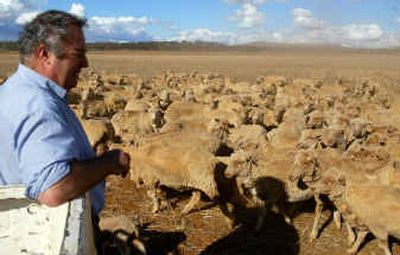Boycott threatens Australian wool trade

SYDNEY, Australia – Since the early 1950s, historians have credited Australia, with its vast tracts of Outback grazing land and booming wool trade, with riding to economic prosperity “on the sheep’s back.”
Now a debate between farmers and animal rights activists over how to treat the skin on a sheep’s backside is threatening to undermine the country’s $2.5 billion wool industry.
Earlier this year, the U.S.-based animal rights organization People for the Ethical Treatment of Animals (PETA) launched a campaign to pressure global retailers to boycott Australian wool over the use of a farming practice called mulesing. The procedure – named for the Australian rancher, J.H. Mules, who invented it – involves slicing flesh and wool away from the sheep’s rump to prevent blowflies from laying their eggs in the warm, damp skin.
The animals are strapped on their backs to metal bars while the skin is cut away, usually without anesthetic.
Farmers say the practice is an essential part of caring for the animals in Australia’s hot climate, although the wool industry has committed itself to phasing out the procedure by 2010 and finding a commercially viable alternative. But PETA brands the practice unnecessary mutilation and wants it stopped immediately.
“The reason we launched this campaign is to show the world that if they’re buying Australian wool as it stands today, they’re supporting one of the cruelest industries in the world,” PETA spokesman Matt Prescott told The Associated Press by telephone from the United States.
Without mulesing, as many as 3 million sheep could die each year of blowfly infestation – or flystrike – according to a statement from the industry association, Australian Wool Innovation Ltd. (AWI). Death by flystrike is so painful, the AWI says, that anyone seeking to ban the procedure should be charged with cruelty to animals.
Peter Corish, president of the National Farmers’ Federation, says he has seen sheep die within three days of being infested with blowflies, and likens mulesing to seeing the dentist: It may be painful, but “the alternative is much, much worse.”
“The mulesing procedure is not pretty,” Corish said. “But I can assure you that death by flesh-eating maggots is much worse.”
PETA says mulesing alternatives – including chemical sprays, variations to diet and cross breeding – are already being practiced by farmers across Australia.
“Mulesing could be phased out today,” Prescott said. “It’s only done out of tradition and convenience.”
But Scott Williams, the animal health and welfare spokesman for AWI, says mulesing is still the only method that offers lifetime protection to the sheep against flystrike, despite decades of research into possible alternatives. As a result, he said, up to 95 percent of farmers who raise merino sheep – Australia’s main wool producers – employ the technique.